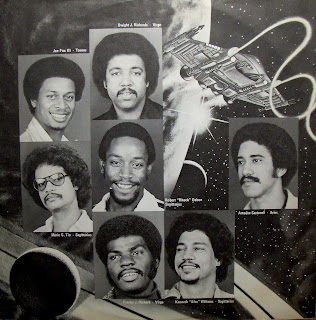You Know You Want It
Dunno. Just in the mood for some more Chocolate Milk here on Chocolate Bunny Eve. I’m heading out for a few days and wanted to leave you with a groove that I find as addictive as high concentrations of cacao.
I’ve featured Chocolate Milk cuts here several times; and I’ve got links to those posts below*. They’re good to read again, not for what I’ve said, but for the comments of the band’s drummer, Dwight Richards, who has been writing in here from time to time since the first few months of HOTG. Maybe we can summon him up again to shed more light on this number. Hope so.
I’ve previously admitted that I was a late arrival to the CM party; and once in, I was slow to engage. At first, I was looking for something “New Orleans” about their music, some of that truly ratty funk that the steamy city can exude, some eccentric expression that could have arisen nowhere else, instead of paying attention to what they were actually doing. A band of high quality musicianship, material, and frequently great grooves, Chocolate Milk made a conscious decision to attune their sound and vibe to appeal to listeners not only in, but far beyond, the confines of the Crescent City. Call it a more “commercial” sound, if you will; but, if you heard this group without knowing anything about them, you likely would not immediately suspect that Professor Longhair, Smokey Johnson, or Allen Toussaint, to shorten severely a long list of local influencers, were lurking in their collective woodshed, and, in the latter’s case, in the control room. Once I figured that one out, I started to dig them for what they had to offer rather than what my expectations were.
Still, I am definitely more of a fan of Chocolate Milk’s output with Toussaint producing - their first four albums – than I am of their subsequent work with George Tobin and, even later, Allen Jones of the Bar-Kays. There’s still some essence of Chocolate City funk below the surface. Toussaint and Marshall Sehorn of Sansu Enterprises in New Orleans took the band on around 1975 and secured their deal with RCA, while released their impressive first LP, Action Speaks Louder than Words **. The producer wrote some of their material over the next few years; but the band could do just fine for themselves in that department, working with Toussaint on the arrangements. Unfortunately (there’s that downbeat qualifier again), while their songs occasionally got into the upper reaches of the R&B charts, CM never could get enough traction to completely break out nationwide, no matter who was calling the shots and how good those shots were.
Since I pick the tunes here, mainly going for what moves me, my biases are fairly evident. All I can offer are a few points of departure and a bit of background. Then, it’s up to you to apply the salt grains as needed and, if you’re interested, explore this band in more detail for yourself. Hope you’ll continue to do that.

"Say Won'tcha"
Chocolate Milk, from Milky Way, RCA, 1979
I have long relished the groove of “Say Won’tcha”, a creation of the band as a whole that appeared on their final LP under Toussaint’s direction, Milky Way, recorded wholly in Los Angeles and released in 1979. What the song, which charted as high as #39, lacks in lyrical heft, it more than makes up for with its deft, intricate, polyrhythmic arrangement of simple parts, something Toussaint could bring out so well in a willing and able aggregation. The continual swirl of the bubbly ingredients spins this confection into a dancing froth of funk – a Chocolate Milk Shake – so tasty, it’s hard not to overindulge. Sweet.
Couldn’t think of a better way to start celebrating the rites of Spring.





